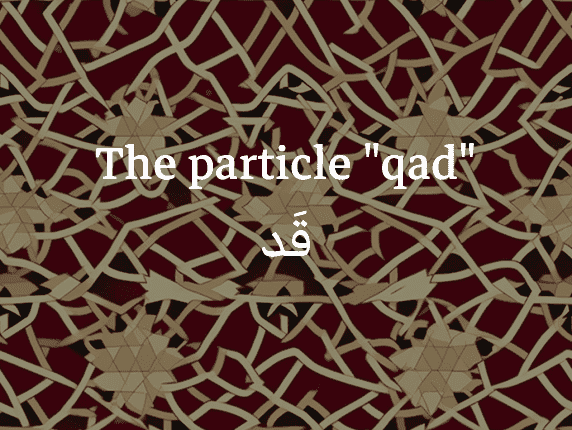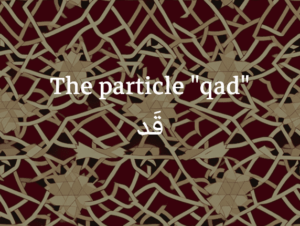The particle “qad” / قَد

Particle قد qad in Arabic is a particle that is only used with verbs in the perfect and imperfect tense. The verb cannot be put in the future or in the negative form even though its use in the negative tense is a widespread error today.
The particle expresses 4 main values depending on the tense of the verb and the context in which it will be used:
- Fulfillment of the action / التحقيق
- Temporal proximity / التقريب
- The expectation / التوقع
- The small probability / التقليل
It is worth mentioning that very often the context will determine the value of قد as the same sentence with قد in two different contexts can have two different translations.
Perfect tense / الماضي
Fulfillment of the action / التحقيق
Express the idea of an action that has indeed occurred and been fulfilled.
- It can sometimes be translated by “already” or “indeed” depending on the context.
| {The believers have (indeed) succeed} Qur’an [Al-Mu’minūn : 1] | قَدْ أَفْلَحَ الْمُؤْمِنُونَ} القُرْآن [المؤمِنون : ١]} |
| We already saw that yesterday | قد رَأَيْنا ذَلِكَ البارِحة |
- It can express the idea of an event that occurred as expected (التَوَقُّع). It can be translated in English by “effectively”, “surely” or “indeed”.
| The teacher [effectively] came | قَدْ جاءَ الأُسْتاذُ |
| We (indeed) returned back home at four o’clock | قَدْ رَجَعْنا إِلى البَيْتِ فِي الساعةِ الرابِعةِ |
- قد can also be translated by the English present perfect tense ((have + verb (ed)).
| She has left the place | قد تَرَكَتْ المَكانَ |
| You have brought up your children in religion | قَد رَبَّيتَ أَوْلادَكَ في الدِّينِ |
Note: we can find قد preceded by the emphatic lām لَ when used in the perfect tense to reinforce this meaning.
وَلَقَدْ أَنزَلْنَا إِلَيْكَ آيَاتٍ بَيِّنَاتٍ…} القُرْآن [البَقَرة : ٩٩]} {And We have certainly relieved to you verses [which are] clear proofs…} Qur’an [Al-Baqara : 99]
Temporal proximity / التقريب
Particle قد can also express the idea of something that just happened or very shortly in the past, often translated by “just”.
| Prayer time has just arrived | قَدْ قامَتْ الصَلاةُ |
| We just arrived home | قَدْ وَصَلْنا إِلى البَيْتِ |
Note: we can find قد preceded by the empathic lām لَ when used in the perfect tense to reinforce this meaning.
لَقَد أَكَلْتُ وَجْبَتي I just ate my meal
Imperfect tense / المُضارِع
The expectation / التوقع
When used with a verb in the imperfect tense قد expresses the idea of an action that is expected to occur in the future. In English, this meaning can be translated as “may”.
| The absentee may come | قَدْ يَأْتِي الغائِبُ |
| I may accompany you to the museum | قَدْ أُواكِبُكِ إلى المَتْحَفِ |
The small probability / التقليل
Particle قد can express the idea of something unlikely because of the rarity of its occurrence. It can be translated by “could”.
| The lazy one could succeed (litt. lazy people rarely succeed) | قَدْ يَنْجَحُ الكَسُولُ |
| He might see his children at the end of the year (meaning: chance is very small) | قَدْ يَرى أَوْلادَهُ فِي نِهايةِ السَنَةِ |
Note: We can find examples in the Qur’an, where قد is used with an imperfect tense verb (مُضارع) expressing the fulfillment of the action/event (التَحْقيق). Outside of the Qur’an, we don’t find قد following a verb in the imperfect tense with this particular value.
{Already Allah knows the hinderers among you…} Qur’an [Al-Aḥzāb : 18] {…قَدْ يَعْلَمُ اللَّهُ الْمُعَوِّقِينَ مِنكُمْ}
القُرْآن [الأَحْزاب : ١٨]
The particle "qad"

Learn about the function and usage of the particle "qad" in Arabic language. Explore examples and its various meanings in context with our comprehensive guide.
Course Provider: Organization
Course Provider Name: ArabiKey
Course Provider URL: https://arabikey.com
5

جَزاكَ اللهُ خَـيْراً أخي